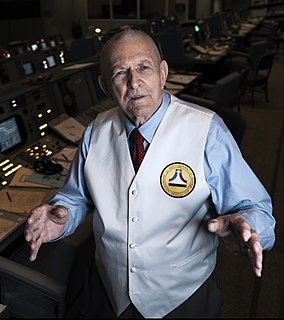A Quote by Buzz Aldrin
When we can demonstrate that we can take off horizontally and put something into orbit, then we can begin to talk about increasing the amount of payload. But to say, 'I'm going to do that and put people into orbit' is a real leap.
Related Quotes
Evolution is all about passing on the genome to the next generation, adapting and surviving through generation after generation. From an evolutionary point of view, you and I are like the booster rockets designed to send the genetic payload into the next level of orbit and then drop off into the sea.
Most Jupiter-sized planets orbit the mother star in a highly elliptical orbit. This means they will often cross the orbit of any Earth-like planet and fling it into outer space, making life impossible. But our Jupiter travels in a near-perfect circular orbit, preventing a collision with any Earth-like planet, making life possible.
Working in TV and navigating success is a tricky thing. It's easier to navigate the hard work of starting out because you just do anything they let you do, but once you get into an orbit, after the thrusters have pushed you into the orbit, now you have to navigate that orbit. There's no choices when you're starting out. You're just like, "Please, let me do anything." But then it turns around and it's like, "We'll let you do anything".
Whatever you can handle, it's up to you. Pick something where you are going to do it to failure--in other words, where you can hardly do it. That's the key. So many people will just take five pound weights and do something 10 times. What are they getting out of it? Nothing! Say you are going to build up your bank account. If you put in a penny a day, it's going take a long while. It's the same with exercise--the more you put into it the more you take out.
America was good enough to make a small compact lighter weight nuclear weapon. The Russians still had these big clunky heavy ones, so they had to build the big boosters in the arm's war, so now all of the sudden Russia could take off the shelf and put into orbit much heavier things than we could, so that's why they had the original leadership.
They're going to come to me and they're going to say numbers for three years and I'm going to use my division and if it sounds good when I hear it, then I'll take it. But I'm not going to say I'll take less (than the max) . . . Put it this way. I won't take a BMW from somebody when I know I can get a Maybach from somewhere else.

































